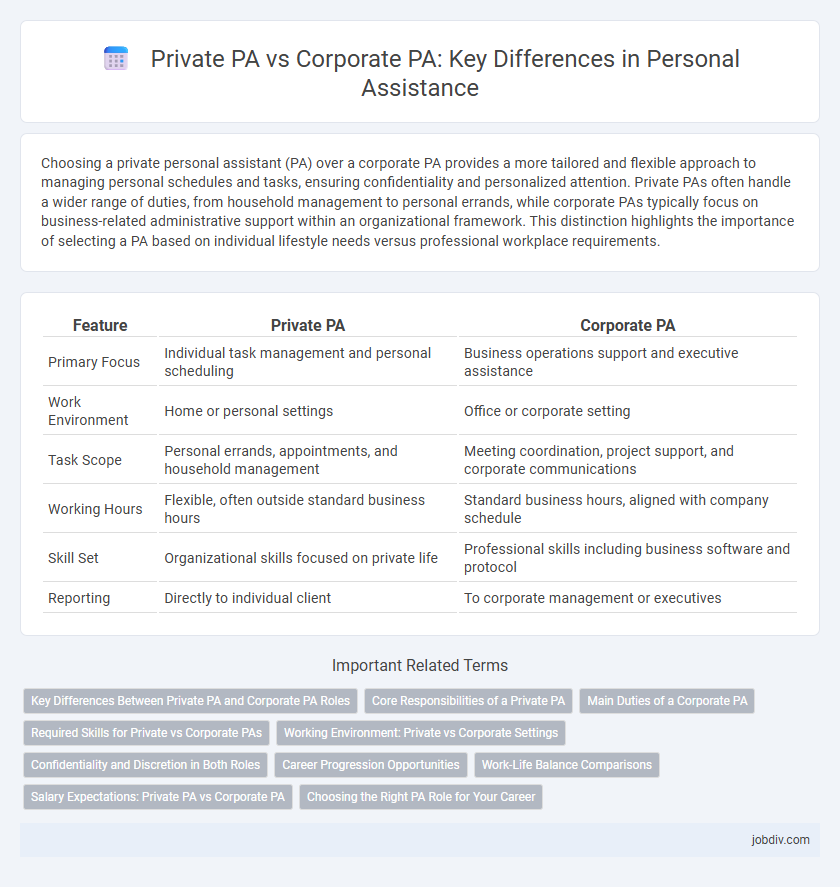Choosing a private personal assistant (PA) over a corporate PA provides a more tailored and flexible approach to managing personal schedules and tasks, ensuring confidentiality and personalized attention. Private PAs often handle a wider range of duties, from household management to personal errands, while corporate PAs typically focus on business-related administrative support within an organizational framework. This distinction highlights the importance of selecting a PA based on individual lifestyle needs versus professional workplace requirements.
Table of Comparison
| Feature | Private PA | Corporate PA |
|---|---|---|
| Primary Focus | Individual task management and personal scheduling | Business operations support and executive assistance |
| Work Environment | Home or personal settings | Office or corporate setting |
| Task Scope | Personal errands, appointments, and household management | Meeting coordination, project support, and corporate communications |
| Working Hours | Flexible, often outside standard business hours | Standard business hours, aligned with company schedule |
| Skill Set | Organizational skills focused on private life | Professional skills including business software and protocol |
| Reporting | Directly to individual client | To corporate management or executives |
Key Differences Between Private PA and Corporate PA Roles
Private PAs primarily support individual executives or families, managing personal schedules, errands, and private matters with a high degree of discretion. Corporate PAs focus on professional environments, coordinating meetings, handling business communications, and facilitating office operations within a company. Key differences include the scope of responsibilities, confidentiality levels, and the nature of tasks aligned with either personal or corporate priorities.
Core Responsibilities of a Private PA
A Private PA manages personal schedules, handles confidential correspondence, coordinates private appointments, and oversees household logistics, ensuring seamless daily operations. They prioritize personalized support tailored to the employer's lifestyle and family needs, unlike Corporate PAs who focus on business meetings, corporate communications, and office administration. Confidentiality, discretion, and adaptability are essential core responsibilities for a Private PA to maintain trust and efficiency in private affairs.
Main Duties of a Corporate PA
A Corporate PA primarily manages executive schedules, coordinates high-level meetings, and handles confidential corporate communications to ensure smooth business operations. They prepare reports, liaise with internal departments, and support strategic initiatives by organizing key corporate events and travel arrangements. Their role demands strong organizational skills and discretion in managing sensitive information within a professional environment.
Required Skills for Private vs Corporate PAs
Private PAs require exceptional discretion, personalized communication skills, and adaptability to manage closely the personal and professional needs of individuals or families. Corporate PAs must excel in organizational skills, corporate communication, and strategic time management to efficiently handle complex schedules, meetings, and executive correspondence in a fast-paced business environment. Both roles demand proficiency in technology and multitasking, but the Private PA emphasizes confidentiality and personal rapport, while the Corporate PA prioritizes professionalism and corporate protocol.
Working Environment: Private vs Corporate Settings
Private PAs operate in personalized, often flexible environments tailored to individual needs, fostering close, one-on-one interactions with employers. Corporate PAs work within structured office settings, coordinating across departments and managing professional communications in a formal atmosphere. The working environment influences task variety, communication style, and work-life balance in each PA role.
Confidentiality and Discretion in Both Roles
Private PAs maintain strict confidentiality managing sensitive personal information for high-profile individuals, ensuring discretion in all communications and activities. Corporate PAs handle confidential business data, strategic plans, and client information with a professional obligation to protect company privacy and uphold legal compliance. Both roles require impeccable trustworthiness, but Private PAs often face more intimate confidentiality challenges related to personal lives.
Career Progression Opportunities
Private PAs often enjoy more diverse responsibilities that can accelerate skill development and lead to varied career paths, including executive roles or entrepreneurial ventures. Corporate PAs typically benefit from structured career ladders within large organizations, with clear opportunities for promotion into senior administrative or management positions. Both roles offer distinctive advancement prospects tailored to different professional goals and work environments.
Work-Life Balance Comparisons
Private PAs offer tailored support catering to personal schedules, enhancing work-life balance by managing both professional tasks and personal errands efficiently. Corporate PAs primarily focus on organizational responsibilities, often leading to longer hours and less flexibility outside office demands. Choosing a Private PA can significantly improve personal time management and reduce stress compared to the more rigid structure of Corporate PAs.
Salary Expectations: Private PA vs Corporate PA
Salary expectations for Private PAs typically range from $40,000 to $70,000 annually, with variations depending on the employer's wealth and location. Corporate PAs often earn between $60,000 and $90,000, reflecting the higher demands and structured environment of corporate settings. Bonus structures and benefits in corporate roles frequently surpass those of private personal assistants.
Choosing the Right PA Role for Your Career
Choosing between a Private PA and a Corporate PA hinges on your career goals and preferred work environment. Personal assistants typically manage individualized tasks and offer personalized support to executives or celebrities, requiring discretion and adaptability. Corporate PAs often handle broader administrative duties within structured organizations, emphasizing professionalism and organizational skills.
Private PA vs Corporate PA Infographic

 jobdiv.com
jobdiv.com